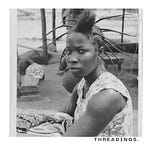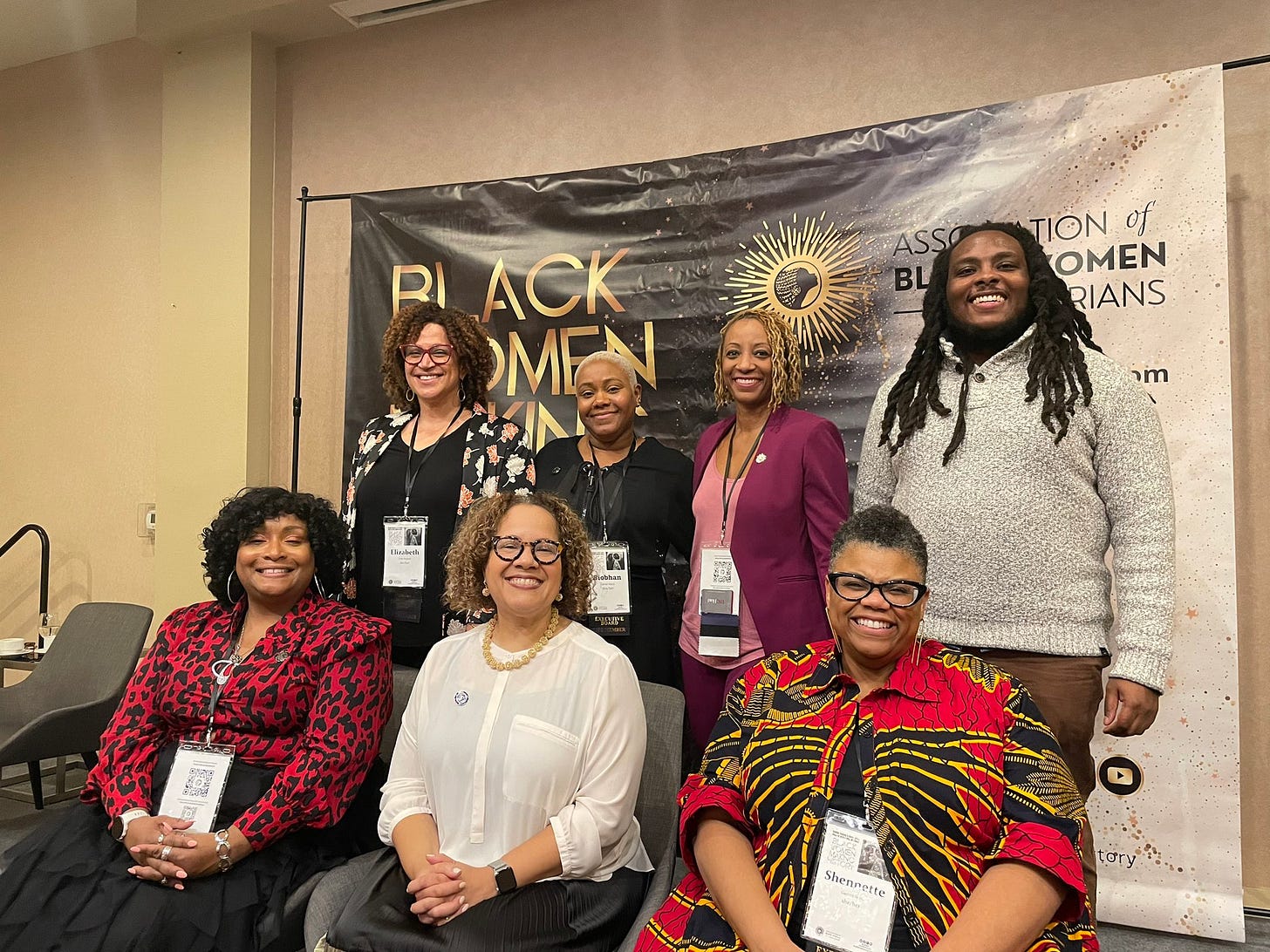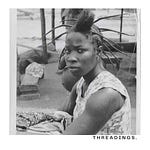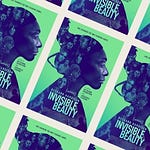an essay I dreamt was entitled “I love, therefore I am.”

Introduction
Da’Shaun L. Harrison has penned one of my favorite texts in the past five years. I have read it three times in nine months and I have become more and more delighted with the person that I become absorbing these words. In Belly of the Beast: The Politics of Anti-Fatness as Anti-Blackness, Harrison presents theoretical frameworks that compel us to meaningful action. I will tell you now and I will tell you for free: belief that compels me to meaningful action is exactly my shit. Dr. Bettina Love, in her book We Want to do More than Survive, describes theory as her guiding light— as her way of making sense of why her body and personhood are routinely marked as “undeserving” while moving throughout the world. I am grateful, to my bones, for theory. Blessed are the workers who make the way clearer with their weighty, weighty words. I relish texts like this.
Harrison, theorist and scholar in fat, Black, genderqueer studies, provides a pithy and effective analysis of the Black, fat, masculine body and the ways it is marked “undeserving.” I began a whole bookclub to dissect this text among peers (the link for which is at the bottom of this email, and will only be available via email if you are listening via a podcast listening app). I will be producing four essays reading through this text, and for the first I would like to examine the radical framework for love presented in the first chapter of their book.
Beyond Self Love
The chapter “Beyond Self Love” begins by interrogating the body positivity movement. Remembering that the thesis of the book argues that anti-fatness and anti-Blackness are synonymous, twin-acting forces of violence on the world, starting with a critique of the current politics of fatness proves useful; examining body positivity, the most predominant politic surrounding a contemporary fat person in the Western world, as a politic with a particular goal rather than a neutral or “healthy” state of mind to achieve is crucial to understanding what our current limitations are. Harrison asks:
“What is the utility of ‘body positivity’ if it only seeks to provide one with a false sense of confidence rather than to liberate all from that which cages the body?” (page 2)
I like this inquiry because it forces us to contend with the four quintessential questions of a close read:
Who wrote it?
For what purpose?
For what audience?
What is it missing?
The body positivity movement at first was a thought campaign headed by and for Black fat folks that wanted space, even if it was just internal space, to think of themselves as lovely. Harrison expands in the first chapter of the kind of fat person that is allowed to garner sympathy and support, and it’s one that is constantly trying to lose the weight on them or one that outwardly performs “health.” That makes external (or internal) love a conditional kind of love. As the movement gained notoriety and was hijacked by white profit motive (as most good things are), the body positivity movement shrouded itself in a cloak of radicalism that it did nothing to earn.

Even when looking through Substack gallery art for visual elements to add to this essay, the first picture returned on the search “body positivity” was a white feminine frame with direct lighting accentuating the flesh that rolls over her stomach and panty line. There is not even a guarantee that this person actually is fat— just the presence of bulbous flesh is enough to have to “love your rolls,” as stated in the small caption of the search. It’s a certain kind of race, a certain kind of shape, and a certain kind of disposition that is deemed worthy of protection under the current “body positivity” politic.
Love is a Politic
Harrison then describes ‘body positivity’ as “benevolent anti-fatness in that it is masqueraded as some sort of semblance of acceptance for fat people when it is, instead, an opportunity for thinness to reroute, but not give up, its hold on fat people’s collective liberation.” (page 4, bolding mine)
The use of the word benevolent here is brilliant— I use the phrase “benevolent racism” all the time to indicate the same thing. It’s a politic that will smile and lovingly suggest that you assimilate because openly stating “fat people should only exist if they affirm and praise thinness” or “I never wish to see a Black person not affirming my whiteness” would be too overt to be marketable. As we consider the purposes, the audience, and the missing parts of body positivity, we can see the ways in which the current body positive movement mimics the goals of thinness. Again from the text, Harrison states the politic of thinness plainly:
“As a politic, thinness is a system that seeks to subjugate and ultimately eradicate fatness and fat people.” (page 4)
I want us all to take note how powerful it is to consider objects or states of being you might have conceived of as naturally occurring or inevitable happenstance as an intentionally pointed politic that was uniquely and purposefully designed. What are the motives of thinness? Who wrote those ideas and how do they benefit? For what audience? What does one stand to gain by converting others to the church of coveting, worshipping thinness, of begging thinness to fall upon them like scorching sun and dry them up?
Do you think you would think thinness is good, right, appropriate, or acceptable if you had not been taught that from birth?
Any love that the state shows you is (always) conditional on your deservingness.
The frameworks presented in the first chapter of Belly of the Beast are not just useful to fat studies and scholarship, or fat Black queer studies and scholarship, but to all areas of life where a certain class of people benefit from an idea hijacking your own self perception. White supremacist capitalistic patriarchy is so effective because it relies so much on good, old-fashioned brainwashing. Consistent results every time! Our systems have done a phenomenal job of convincing us that some people are literally born to suffer. I would even argue that the vast majority (if not the entirety) of these hierarchal systems where the bottom is exploited to continue the ruling privilege of the top are based upon deservingness— the idea that any person has done or can do or did do something to deserve their place in life. The concept of Deservingness automatically adds conditionary measures to all of our love, including every aspect of our own love of self. Where there is a “worthy,” their is an “unworthy,” by design.
The reality I see as a therapist: I constantly had to remind my clients not to be so hard or critical on themselves because all of them, in some way or another, were wading through a system designed to hurt them. Poverty is an intentional genocide, the suffering of the lowest classes as a spectacle is the point, etc. This is also the reason my least favorite modality is Cognitive Behavioral Therapy— and not even because it doesn’t work! CBT is pretty helpful for circumstances within your control… it’s just that my clients were Black single mothers, folks on medicaid, laborers enduring union strikes, and, in whole, people that were tasked with the endless plight of survival. Most of the stressors in their lives were firmly outside of their control and most of those stressors did indeed make their lives significantly worse than the lives of the “more deserved” classes sitting above them (including me, who was a cushy university grad student at The University of Chicago!). No matter how much I compelled them to love themselves and be kinder to themselves, self kindness and self regard, even self love, will never and can never do anything to sincerely change their circumstances.
Our. I should say “our.” I am, even despite the spoils of elite education, amongst the class of the undeserved by many intersections. I love myself sincerely and without ceasing. I am still depressed and viciously angered at the circumstances of my most beloved every single day.
Self Love in Community, my most beloved thing
From the text:
Radial self love (as in self love with no conditionality) is “necessary cultural work,” as Taylor states. It challenges our relationship to our own bodies and to other people’s bodies, and that will always be a work that can make our realities after the destruction of the world better than they were before, but it does not demand more than that because it cannot demand more. (page 6, bolding mine)
The only thing that self-love is accountable to is the self. Self-love can only make demands of the self it belongs to… so what is your own self? What are you made of? What parts of the whole are you accountable to? What does that whole make up and what does it want from you?
I have two maxims that I often use about my selfhood:
I am an amalgamation of the people that build me.
My Politic is alive and she will kill me.
Because of the way that I conceive of and receive myself, I consider my personhood a walking paper-mache art piece made up of bits of my community. I am little strips of the people that love me all stuck together around something full at my core. Full like a jar of dirt. Full and soft and something you can sink into, like fertile earth.
I recognize that the only thing that my self-perception shifts is my own internal world. This word that we wade through benefits greatly from us individually weighing ourselves by our “deservingness,” predicated, of course, by what this maniacal and genocidal state told us what we should reward ourselves for being. I do not have to yield to that thinking. It’s good for me to not yield to that thinking. Those of us that survive despite of the state will continue to be destabilized by it.
That is the sum of the demand that I can make of my own self love: don’t bow to them inside of your own mind. Self love does not shift the love that this world withholds from you, and you are right to want to be loved by the world. We are right to be wanted by the world! Our original Mother Earth showed so much endless love for us, and she and her children were pillaged by a select and detrimental few. You are not wrong or “crazy” to mourn not being loved by the world in full.
Self love is only good for liberating the self of the shackles that are self-inflicted. Communal love and effort are needed to make lasting change to any sort of caretaking for the mind. Communal love is the thing that will compel us to re-create a world that loves us by rote1. Why love? Why do we need communal love, and not just communal space or communal affinity or community trust? What is love and what is it good for?
from the text:
“if self-love is where we start, it must be the driving force behind our continued struggle; otherwise, we become stagnant and immovable, fixated on always challenging how we see our bodies and never getting to the place where we no longer have to interrogate our bodies at all.” (page 6, bolding mine)
Self-love is only good for releasing self-subjugation. If the love that you cultivate for yourself is content with living only inside your head, who are you? How do I love myself and not love my mother, my sister, my cousin and my compin2, my godmother, my great aunt and my grandmother, who have built me and named me with their own hands? I love myself and I love all of my beloveds and I myself am beloved by them and me. How does my self love not compel me to act in their best interest, when their well-being and my well-being are so intimately bound?
Love is the feeling that compels you to action and love is also the action itself.
love is the testament, the very commitment to action as much as it is the action itself. I love myself so I will act in my self interest, which leads me to love my community. I love my community and wish to act in our best interests, which leads me to care for myself and for others intimately and without condition. Finding, building, and maintaining community where I can be vulnerable enough to be steadfast and humble and accountable is the work of my lifetime. It makes the commitment to action as natural as inhaling.
self love is not a saving kind of love.
ismatu gwendolyn
from the audio reading: praise for Da’Shaun L. Harrison and Belly of the Beast, edited for clarity:
One of the reasons I love this text is because it lays out a framework that is mobile. There are lots of ways that your politic has to be specific to the people group you’re serving, right? You create a politic that caters to a specific kind of marginalization because, while all of our oppressions are linked and all of our freedoms are linked, freedom does not look the same for every person that’s subject to colonization.
So there’s a lot of theory that has to be specific— or even somewhat hyper-specific— to the group that you’re serving. And this is a text that lifts up a group targeted at multiple intersections: the fat, the Black, the queer, and the masculine rather than the feminine. It would be really easy to create a politic, a framework, a logic, an ethos, that is hyper-specific and might make someone feel like they have to pick up six different texts just to understand what this person is saying.
But the way that they lay out their ideas about examining something as a politic and then using that politic to spur you to action is so simple, so straight-forward, and so effervescent that I can pick it up and take it from self-love of the body (and unlearning anti-fatness, synonymous with anti-Blackness) to self-love of the metaphysical body— the mind, the space, the soul that’s been hijacked by contemporary therapy and capitalistic ideas of wellness) and say the same thing!
That “self-love” as a politic is seeking to make you productive rather than well, and if you really wanted to be well, you would fix the communities, and that self-love will not save you and it will not save you from the communal issues of being subjugated by the state.
Do you know the level of care and brilliance it requires to make a tool so simple that it is that multipurpose?
Brilliant and bravo.
-ngib-
from the audio read: by rote. by rote, by memory, by design.
Krio word for company (like a friend or loved one that’s a peer that you keep company with)













12| Self love literally can never save us.